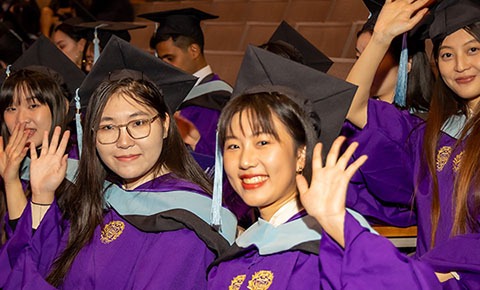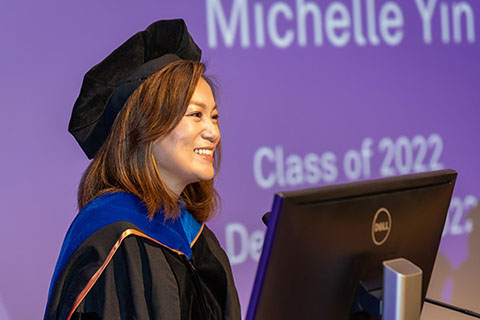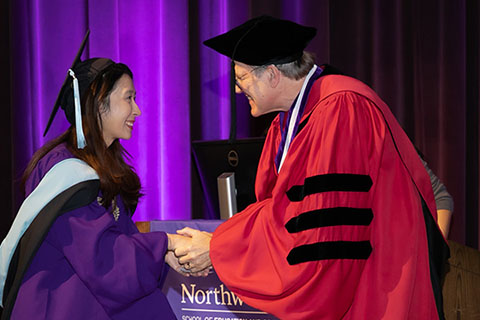Northwestern Confers Dual Master’s Degrees
 The world’s first cohort of students to earn a dual master’s degree in applied economics and social and economic policy received their diplomas in early December at Northwestern University’s McCormick Auditorium during a ceremony that highlighted the importance of cross-cultural understanding.
The world’s first cohort of students to earn a dual master’s degree in applied economics and social and economic policy received their diplomas in early December at Northwestern University’s McCormick Auditorium during a ceremony that highlighted the importance of cross-cultural understanding.
The Master’s in Social and Economic Policy program, a joint effort between Northwestern University and The Chinese University of Hong Kong, was launched in August of 2020, during a world-wide pandemic, economic uncertainty, and a period of strained transpacific relations.
Yet those who dreamed up the ambitious effort said that current events underscored the need for new leaders who understand economics and policy from multiple perspectives. The program’s international connections and cultural exchange are designed to help forge mutualistic partnerships and set the students up for careers as economic analysts, researchers, and policymakers.
 “We made it through this unpredictable process together,” program director Michelle Yin (left), associate professor in Northwestern’s School of Education and Social Policy, told the 43 purple gowned graduates.
“We made it through this unpredictable process together,” program director Michelle Yin (left), associate professor in Northwestern’s School of Education and Social Policy, told the 43 purple gowned graduates.
“The training you received and this unique experience of adapting to two cultures on two separate campuses will equip you with the skills to see this world with a pair of critical eyes and approach others with a newfound appreciation of their differences, as well as their similarities,” Yin said.
The interdisciplinary program began in August of 2021 in Sha Tin, Hong Kong, where students spent 10 months taking quantitative courses taught by faculty from both The Chinese University of Hong Kong and Northwestern.
In June of 2022, students transitioned to Northwestern’s Evanston campus for 7 months of additional coursework and extracurricular activities, including a trip to a Chicago Cubs baseball game and a weekend session with students in the Master of Science in Learning and Organizational Change program.
The program joins two cultures and education systems but leverages each institution’s strengths. The Chinese University of Hong Kong is known for theoretical and empirical work in economics. The School of Education and Social Policy, meanwhile, brings strong policy design and evaluation skills to the table, giving the program a practical component.
Conceived by former School of Education and Social Policy Dean David Figlio and colleagues at The Chinese University of Hong Kong, including co-director and economics professor Duozhe Li, the Master’s in Social and Economic Policy program gave students technical skills and the practical ability to evaluate policies and programs in Chinese and US contexts.
“In both mainland China and Hong Kong, the classes are more like lectures,” said graduate Tianzong Lu, a self-described “adventurer.” “Students receive the ideas from the professors. However, in the United States, the professors encouraged us to express ourselves. So it was very different, but I think we did a good job adjusting to the system here.”
In addition to Yin and Li, convocation speakers included School of Education and Social Policy Interim Dean Dan P. McAdams, and David Figlio, now provost at the University of Rochester.
“You entered the program as an inquisitive student– and now exit as a trained practitioner ready to take on the world,” Figlio said. “Continue learning throughout your careers not only with open minds, but with open hearts. Remember to embrace the differences of others who will cross your path along the way.”
For graduate Suyash Mohan, 22, who was raised in India and Hong Kong, the program blended his interests in international trade and economic development. In addition to earning the program’s Excellence in Professional Development Award, he found time to work on Breer, an upcycling startup he cofounded that makes craft beer from surplus bread.
Graduate Carlotta Esposito, who worked in development economics after graduating from McGill University, had studied China’s global development path but sought out the dual degree program for more quantitative training. “I wanted to make sure the work that was being done was not as politically beholden, as it often is in policy, especially in the context of energy and environmental conservation,” she said.
Though Esposito speaks Mandarin and has lived in China multiple times on study abroad trips, she called the program intensely immersive. “It forced me out of my shell,” she said.
 McAdams, who welcomed the students on a hot day in June, capped their experience by thanking them for their energy, ideas, and enthusiasm. Graduates made the most of their seven months both in and out of the classroom – several said walking along Lake Michigan or waking up to see the sun rise over the water will be something they never forget.
McAdams, who welcomed the students on a hot day in June, capped their experience by thanking them for their energy, ideas, and enthusiasm. Graduates made the most of their seven months both in and out of the classroom – several said walking along Lake Michigan or waking up to see the sun rise over the water will be something they never forget.
“By simply being here and offering your perspectives in our classes and in our community, you have enriched us,” McAdams said. “You have made us a better school and a better community.
“As the first cohort to graduate from our dual degree program, know that your legacy is long-lasting. We will keep you in our hearts here at Northwestern University. And we will always remember you fondly as ‘the first.’ I can’t wait to see what you go out and do.”